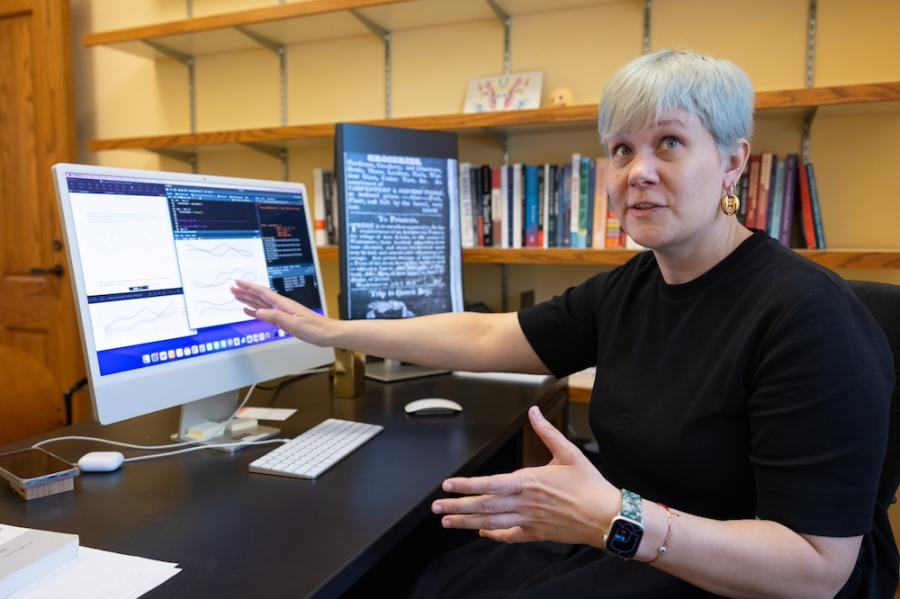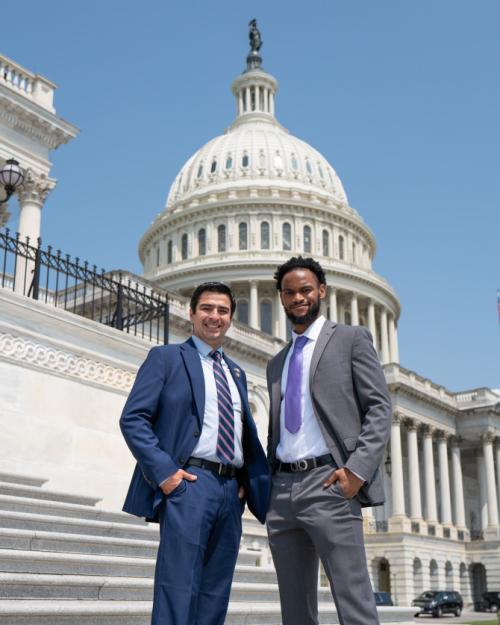On Jan. 4 and 5, 2021, 27 out of 30 prime time news segments on Fox News were angry in tone, according to research by political scientist Erin Cikanek. Then on Jan. 6, the world viewed a violent display of partisan emotion, as the U.S. Capitol Building in Washington, D.C. was attacked by a mob of former President Trump’s supporters.
Angry news and angry actions: Cikanek, a Klarman Postdoctoral Fellow in government in the College of Arts and Sciences (A&S), is studying the connections.
“How people feel about politics can be just as integral as what they think about politics – liking or disliking something, being angry, being afraid,” Cikanek said. “We know from political psychological research that when people have these feelings, it drives how they think and behave."
Some scholars hold the view that citizens get their ideas about government and policies from political leaders, celebrities and other public figures. Cikanek builds on this idea by proposing that citizens pick up not just what to think but how to feel from television news. By studying prime time news programming and peoples’ reactions to it, Cikanek is finding that Americans gather different emotional information from partisan news programs than they do from traditional outlets, with consequences for democratic norms, political violence and polarization.
This research points out the power of partisan news, said Peter K. Enns, professor of government (A&S) and the Brooks School of Public Policy and Robert S. Harrison Director of the Cornell Center for Social Sciences.
“Erin’s research argues that the presence of strong emotional cues, such as anger and outrage, are one of the distinguishing characteristics of partisan news, and these cues have a profound effect on the political environment,” said Enns, who is Cikanek’s faculty host. “This research on how emotional appeals in media influence political attitudes and behavior offers important theoretical and empirical contributions to understanding increasing political polarization and declining support for democratic norms.”
During her Klarman fellowship, Cikanek is writing a book on the way prime time television news programs broadcast political feelings alongside political information. She takes a broad definition of “news.”
“While some people would say that Fox News or MSNBC is not news, I consider it news because people in the American public consider it news,” she said. “I contend that when viewers opt into partisan news programs, they’re getting very different emotional information from these broadcasters than if they were in traditional, nonpartisan news like ABC, NBC, CBS.”
Cikanek has analyzed TV news coverage of all American national elections from 2000 to 2020, asking survey participants to rate coverage on ABC, NBC, Fox, CNN and MSNBC as angry, anxious, afraid, hopeful, frustrated or enthusiastic.
The cable news environment was angrier both in the intensity of the anger and the frequency, the surveys found, compared to the traditional news environment.
In an extension of this research, Cikanek recently surveyed primetime news coverage for Fox and MSNBC between the night the 2020 presidential election was called (Nov. 9, 2020) and the lead up to Jan. 6, 2021, measuring an angry emotional environment on Fox before the insurrection in Washington, D.C.

In a related survey experiment, Cikanek provided transcripts of news already flagged by readers as angry, anxious or enthusiastic to political partisans, to see how viewers respond to different emotions in news pieces. When people are exposed to news from their partisan point of view, the experiment found, they tend to take on the emotions of their co-partisans. When exposed to out-partisan news, people get angry when they see the opposition angry, but they also get angry when they see the opposition party doing well.
“It brings about a puzzle – can this circulation of anger be stopped?” Cikanek said. “Or as long as we’re in these partisan news environments, will we keep anger circulating?”
Anger is not necessarily a bad thing in politics, Cikanek noted, pointing to psychological research showing that feelings drive how people think and behave in specific ways. People who are angry take greater risks, confront problems and take action, whereas people who are fearful pause and think about what they should be doing rather than just following along with their predispositions.
“When people are angry, they’re more likely to show up to vote, which is something we want, right?” she said. “With anger, we have this dual-edged thing that might be democracy-promoting on the one hand but might cause a bunch of problems on the other hand.”
In today’s polarized political context, simply recognizing that there are emotional differences between news outlets can start conversations and hopefully bring more scholars into this line of research, Cikanek said, “to consider the ways we can think about emotions and democracy in addition to information and democracy.”
The Klarman Fellowship has boosted Cikanek’s research in several ways. Research funding enables her to conduct surveys about television news at the center of her current research. She’s built connections to Cornell’s Roper Center for Public Opinion Research and the government department’s Politics of Race, Immigration, Class & Ethnicity (PRICE) Initiative for perspective on social identity. Faculty members in government and psychology have been helpful, and she’s presented research to fellow Klarman Fellows, who contributed points of view from many different fields.
“The intellectual community at Cornell is incredible,” she said.




